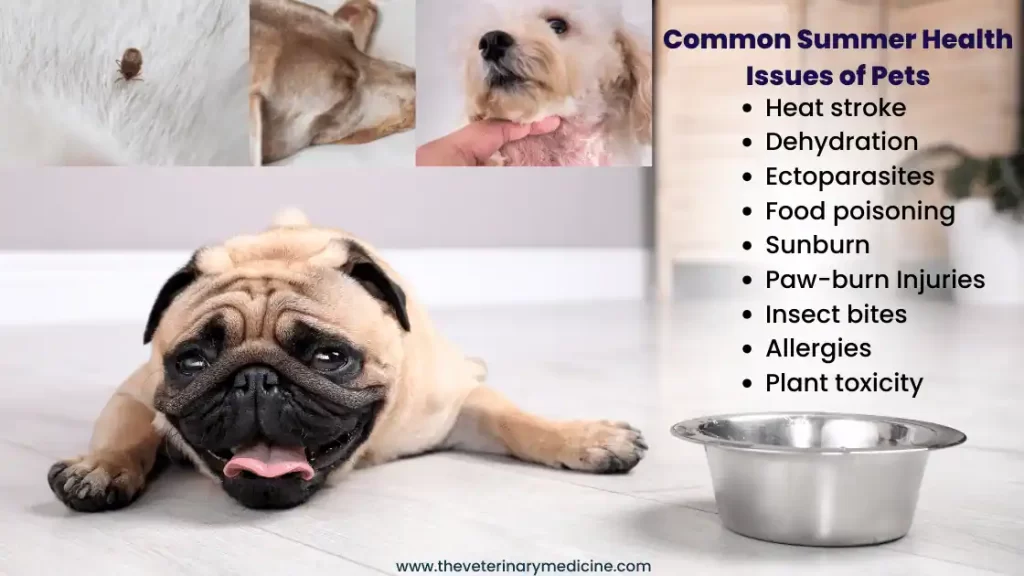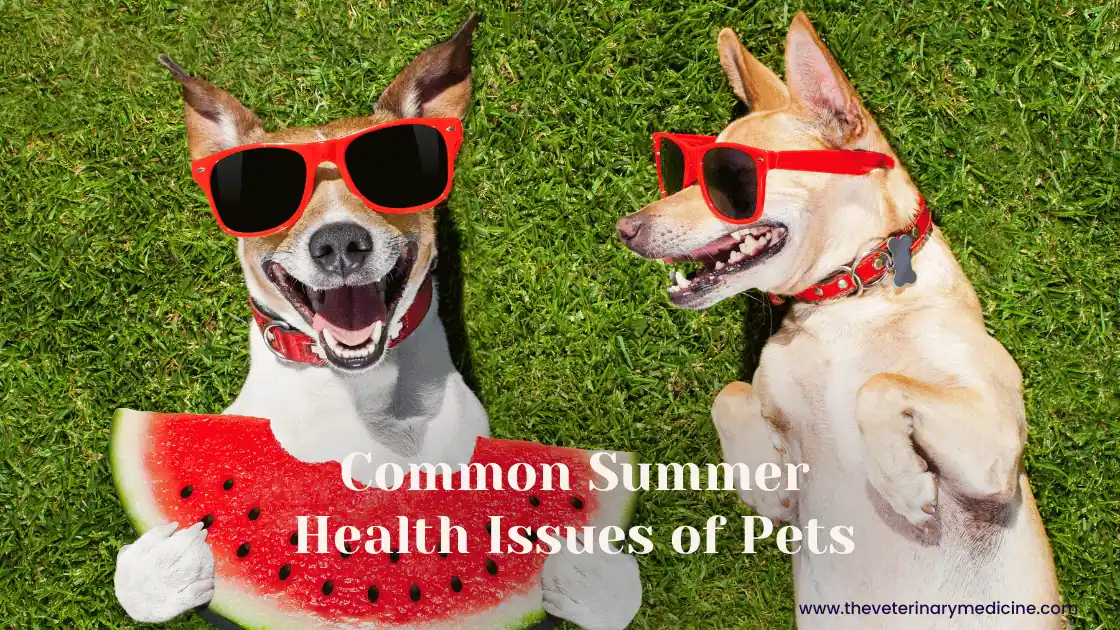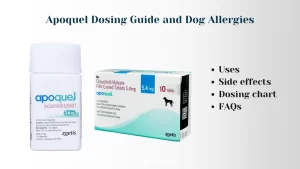Summer season is for fun-filled adventures and outdoor frolicking for humans and pets both, but it also presents unique challenges and problems for dogs, cats, feathered, and scaled companions. As temperatures rise and the sun shines brighter, our beloved pets become susceptible to a range of seasonal health concerns. Heat stroke, dehydration, sun burns, food poisoning and ectoparasite like ticks, fleas, insect bites and associated problems like skin issues, tick fever are common during summer season in pets.
This article includes the most common summer health issues affecting dogs, cats, birds, and other popular pets, equipping you with the knowledge of management to keep your animal friends safe and healthy during the hottest months. Remember, prevention is always better than cure!
Heatstroke:
Heatstroke, a potentially fatal condition caused by overheating is the most common problem of peak summer. It affects all animal species but poses a higher risk to brachycephalic or short-nosed dog breeds like Pugs, Shih-Tzu, Chow-Chow. Overweight or obese pets, and those with thick fur or dark coats are at more risk of heat stroke. Early detection and quick action are crucial, so be vigilant for symptoms like hyperthermia, excessive panting, drooling, glazed eyes, lethargy, vomiting, and seizures.
Managing Heatstroke:
- Immediate Steps: Move your pet to a cool, shaded area. Offer cool water (not ice water) in small sips and apply cool, wet towels to their body. Never leave them in a hot car. Keep windows open and never leave your pet unattended in such condition.
- Seek Veterinary Care: Immediately contact your veterinarian for professional diagnosis and proper treatment. This often involves intravenous fluids, medications, and continuous monitoring.
Prevention:
- Limit outdoor activity during peak sun hours (10 AM-4 PM).
- Ensure constant access to fresh and cool water.
- Buy cooling vests or mats if your pet is susceptible for heat stroke.
- Avoid strenuous exercise or taking out in hot weather.
- Never leave your pet unattended in a parked car. Keep AC on or windows open even if leaving for a few minutes.
Dehydration:
Pets do not have so many sweat glands like humans. They regulate body temperature during summer mostly through panting. They also lose fluids through sweating, urination and other activities. Dehydration, if left unchecked, can lead to serious health complications. Be on the lookout for signs like dry gums, lethargy, sunken eyes, increased skin tent time, increased CRT (capillary refill time) and decreased urination or dark yellow coloured urine. Dehydration during summer is also common in cats and birds.
Managing Dehydration:
- Encourage your pet to drink plenty of fresh water or water in any form. Flavoured water, pet electrolyte solution in water, butter milk, curd or broth can entice picky drinkers. You can add extra water in dog food if preparing at home or soaking kibbles.
- Always carry portable water bowls and offer water frequently during walks and outdoor activities. This will help in preventing dehydration as well as heat stroke.
- Consider adding ice cubes to their water bowl for an extra cooling effect.
- Electrolyte supplements like Ordelyte Pet, Gutty Pet, Venlyte Powder or recommended by your veterinarian can help in severe cases.
Prevention:
- Always ensure and provide constant access to clean water.
- Encourage and monitor water intake, especially on hot days. Do not take your pets outside or take outside during peak of the day.
- Avoid salty snacks or dry food which can worsen dehydration.
- Choose water-rich fruits like watermelon, papaya and vegetables like cucumber, carrots etc. as treats to promote water intake.
Ectoparasite Infestation (Ticks, Fleas) and Mosquitoes:
Warm weather creates a perfect breeding ground for pesky parasites like ticks, fleas, lice and mosquitoes. These critters not only cause discomfort and irritation (flea allergy dermatitis) but also transmit potentially serious diseases like tick fever (Babesiosis, Ehrlichiosis and Heartworm etc). Regular parasite prevention is crucial for safeguarding your pet’s health. Warm and humid weather is favourable for all these ectoparasites and associated risks.
Managing Ectoparasites:
- There are many products available in the market like powders, spot -on solutions, topical sprays, tablets and tick-collars for prevention. Choose a veterinarian-recommended parasite prevention product based on your pet’s species, age, and lifestyle.
- Conduct regular tick checks, especially after outdoor adventures. Groom your pet regularly / daily if needed. Pest control may be needed in case of heavy infestation.
- Treat promptly if you discover any parasites to avoid any health complication.
- Use mosquito repellent specifically formulated for pets. Herbal preparations are better if using on regular basis.
Prevention:
- Maintain a clean and tidy yard free of debris and overgrown areas.
- Use natural deterrents like cedar chips or citronella candles around outdoor spaces or in fumigator or vaporiser for better results.
- Limit exposure to common dog areas or areas known for high parasite activity.
- Use anti-tick/ flea measures in the season to avoid infestation.
- Regular cleaning of pet beddings and common areas.
Food Poisoning:
Summer barbeques and picnics are tempting for us, but some leftovers and common human foods are toxic to pets. Prepared food in summers spoils much faster than winters and may lead to food poisoning. Chocolate, xylitol (artificial sweetener) and certain fruits (Nuts, Avocado, Grapes, Raisins) can cause serious illness, even death. Always take care of what your pet ingests. Any food poisoning may lead to vomiting, diarrhoea, lethargy, hypersensitivity or serious signs.
Managing Food Poisoning:
- If you suspect your pet has eaten something toxic, contact your veterinarian immediately, even if they seem fine. If vomition can be induced, then use safe options like Hydrogen Peroxide to minimise the risk of toxicity.
- All poisons or food are not safe vomiting. Do not induce vomiting unless instructed by your veterinarian.
- Keep potentially harmful foods and medicines/ supplements out of reach and educate family members and guests about pet-safe treats.
Prevention:
- Always supervise your pet around food and garbage cans especially after house parties.
- Store toxic foods, fruits securely, away from curious pets.
- Research pet-safe alternatives to popular human treats or prefer pet brands.

Additional Summer Health Concerns:
- Sunburn: Pets with light fur or hairless areas are susceptible to sunburn. Paws on hot surfaces like roads, cemented floors or pavements are susceptible for burns during peak sun hours of the day. Use pet-safe sunscreen and provide shade during peak sun hours. Protective shoes (boots) for pets can be used or taken be carried into lap if possible, for short distances if it’s necessary to take them out.
- Pool Safety: Do not force your pet for jumping into the water or swimming and supervise your pet around pools and bodies of water to prevent accidental drowning. Always consult your vet if your pet has health issues like cardiac problems, skin issues or recently have recovered from any illness.
- Stinging Insects: Allergic reactions to bee stings and mosquito bites can be life-threatening. Seek immediate veterinary care if your pet experiences symptoms of anaphylaxis like swelling, difficulty breathing, or other severe symptoms like falling unconscious.
- Allergies: Summer brings about various environmental allergens, from pollens to grasses. Pets may develop allergies, leading to itching, redness, and discomfort. These factors can be contributing to pets already suffering from atopic dermatitis. Identifying the allergen and consulting with a veterinarian for appropriate treatment is essential.
- Toxic Plants: Many common indoor and outdoor plants are poisonous to pets. Familiarize yourself with toxic plants in your area and keep them out of reach.
Conclusion: Be Proactive and Enjoy a Safe Summer with Your Pet!
By understanding the common summer health issues affecting pets and taking proactive steps towards prevention and management, you can ensure your furry friend enjoys a safe and healthy season. Remember, these are just some of the potential concerns, and your veterinarian remains the best resource for personalized advice and treatment specific to your pet’s needs. Senior pets may be at more risk than younger ones.
Here are some additional tips for a paw-some summer:
- Schedule a pre-summer checkup: Discuss potential risks and preventative measures with your veterinarian.
- Create a cool haven: Provide shaded areas, air conditioning, and cooling mats for your pet to retreat to.
- Plan outdoor activities wisely: Opt for early mornings or evenings when temperatures are cooler.
- Grooming matters: Regular brushing can help prevent overheating, skin infections, and keep pests at bay.
- Dietary changes: Encourage water intake, promote feeding of water rich food or fruits, treats etc.
- Ectoparasite control: Follow preventive measures to prevent tick, flea infestation during the season.
- Be the voice for your pet: Advocate for their needs and do not hesitate to seek vet care if you sense something is wrong or your pet is susceptible for these summer problems.
With a little extra attention and care, you can transform summer into a season of fun, bonding, and unforgettable memories with your furry, feathered, or scaled companion. By incorporating these tips and tailoring them to your specific pet’s needs, you can create a safe and enjoyable summer season for both of you. Remember, a happy and healthy pet makes for a happy and healthy summer!
Disclaimer: The information provided in this article is for informational purposes only and should not be construed as veterinary advice. Always consult with a licensed veterinarian for diagnosis and treatment of your pet’s specific health concerns.





